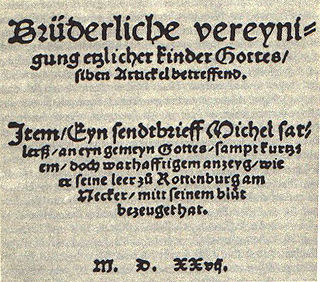 W
WThe 28 fundamental beliefs are the core beliefs of Seventh-day Adventist theology. Adventists are opposed to the formulation of creeds, so the 28 fundamental beliefs are considered descriptors, not prescriptors; that is, that they describe the official position of the church but are not criteria for membership. These beliefs were originally known as the 27 fundamental beliefs when adopted by the church's General Conference in 1980. An additional belief was added in 2005. The Seventh-day Adventist Bible Commentary is a significant expression of Adventist theological thought.
 W
WThe 1890 Manifesto is a statement which officially advised against any future plural marriage in The Church of Jesus Christ of Latter-day Saints. Issued by church president Wilford Woodruff in September 1890, the Manifesto was a response to mounting anti-polygamy pressure from the United States Congress, which by 1890 had disincorporated the church, escheated its assets to the U.S. federal government, and imprisoned many prominent polygamist Mormons. Upon its issuance, the LDS Church in conference accepted Woodruff's Manifesto as "authoritative and binding."
 W
WThe Apology of the Augsburg Confession was written by Philipp Melanchthon during and after the 1530 Diet of Augsburg as a response to the Pontifical Confutation of the Augsburg Confession, Charles V's commissioned official Roman Catholic response to the Lutheran Augsburg Confession of June 25, 1530. It was intended to be a defense of the Augsburg Confession and a refutation of the Confutation. It was signed as a confession of faith by leading Lutheran magnates and clergy at the meeting of the Smalcald League in February, 1537, and subsequently included in the German [1580] and Latin [1584] Book of Concord. As the longest document in the Book of Concord it offers the most detailed Lutheran response to the Roman Catholicism of that day as well as an extensive Lutheran exposition of the doctrine of Justification.
 W
WThe Articles of Religion are an official doctrinal statement of Methodism. John Wesley abridged the Thirty-Nine Articles of the Church of England, removing the Calvinistic parts among others, reflecting Wesley's Arminian theology.
 W
WThe Athanasian Creed, also called the Pseudo-Athanasian Creed and sometimes known as Quicunque Vult which is both its Latin name and opening words meaning "Whosoever wishes", is a Christian statement of belief focused on Trinitarian doctrine and Christology. The creed has been used by Christian churches since the sixth century. It is the first creed in which the equality of the three persons of the Trinity is explicitly stated. It differs from the Nicene-Constantinopolitan and Apostles' Creeds in the inclusion of anathemas, or condemnations of those who disagree with the creed.
 W
WThe Augsburg Confession, also known as the Augustan Confession or the Augustana from its Latin name, Confessio Augustana, is the primary confession of faith of the Lutheran Church and one of the most important documents of the Protestant Reformation. The Augsburg Confession was written in both German and Latin and was presented by a number of German rulers and free-cities at the Diet of Augsburg on 25 June 1530.
 W
WThe Seventh-day Adventist baptismal vow is a list of 13 belief statements which a person joining the Seventh-day Adventist Church is given and accepts at believer's baptism. In Adventist understanding, baptism, is associated with officially joining the Adventist church, which is a part of the community of believers in Christ. The vow is explained in the church manual. In 2005 an alternate vow consisting of three statements was approved at the General Conference Session, and the baptizing pastor now has a choice of which set to use. They complement the 28 Fundamentals.
 W
WThe Book of Concord (1580) or Concordia is the historic doctrinal standard of the Lutheran Church, consisting of ten credal documents recognized as authoritative in Lutheranism since the 16th century. They are also known as the symbolical books of the Evangelical Lutheran Church.
 W
WThe Chicago-Lambeth Quadrilateral, frequently referred to as the Lambeth Quadrilateral or the Lambeth-Chicago Quadrilateral, is a four-point articulation of Anglican identity, often cited as encapsulating the fundamentals of the Anglican Communion's doctrine and as a reference point for ecumenical discussion with other Christian denominations. The four points are:The Holy Scriptures, as containing all things necessary to salvation; The creeds, as the sufficient statement of Christian faith; The dominical sacraments of baptism and Holy Communion; The historic episcopate, locally adapted.
 W
WThe Confession of Faith of the Evangelical United Brethren Church is one of five established Doctrinal Standards of the United Methodist Church, along with the Articles of Religion, the General Rules of United Societies, the Standard Sermons of John Wesley, and John Wesley's Explanatory Notes on the New Testament. The United Methodist Church adopted the Confession of Faith in 1968 when the Methodist Church merged with the Evangelical United Brethren Church to form the United Methodist Church. The Confession of Faith covers much of the same ground as the Articles of Religion, but it is shorter and the language is more contemporary. The Confession of Faith also contains an article on the Judgment and Future State which had not been present in the Methodist Articles of Religion.
 W
WThe Confutatio Augustana was the Roman Catholic refutation (confutation) of the Augsburg Confession, often referred to in the theological literature as simply the Confutatio.
 W
WThe Dordrecht Confession of Faith is a statement of religious beliefs adopted by Dutch Mennonite leaders at a meeting in Dordrecht, the Netherlands, on 21 April 1632. Its 18 articles emphasize belief in salvation through Jesus Christ, baptism, nonviolence (non-resistance), withdrawing from, or shunning those who are excommunicated from the Church, feet washing, and avoidance of taking oaths.
 W
W"The Family: A Proclamation to the World" is a 1995 statement issued by The Church of Jesus Christ of Latter-day Saints which defined the official position of the church on family, marriage, gender roles, and human sexuality. It was first announced by church president Gordon B. Hinckley.
"For the Strength of Youth" is a pamphlet distributed by The Church of Jesus Christ of Latter-day Saints that "summarizes standards from scripture and from the writings and teachings of Church leaders." The pamphlet's target audience is young men and young women of the LDS Church, although its principles are applicable to all age groups in the church. It is available on the Internet and in print form. The pamphlet was first published in 1965, and its 9th and most recent edition was released in 2011. The pamphlet was meant to be put "in the hands of every young person in each ward".
 W
W"God Loveth His Children" is a pamphlet produced by The Church of Jesus Christ of Latter-day Saints for members with same-sex attraction attractions. It was approved in April 2007 and was announced in July 2007 through a letter to LDS Church bishops and stake presidents, and is available in 27 languages. It represents an official statement from the church, and follows an unofficial interview with apostle Dallin H. Oaks and general authority Lance B. Wickman in April of that year. The pamphlet is not new revelation or doctrinal change, but a continuation of the direction the church has been going in the past several years. However, church leaders say chances are slim it would deviate from its sanctions against active gay relationships.
 W
W"Jesus is Lord" is the shortest credal affirmation found in the New Testament, one of several slightly more elaborate variations. It serves as a statement of faith for the majority of Christians who regard Jesus as both fully man and God. It is the motto of the World Council of Churches.
 W
WThe Magdeburg Confession was a Lutheran statement of faith. It was written by nine pastors of the city of Magdeburg in 1550 in response to the Augsburg Interim and the imposition of Roman Catholicism. The Confession explains why the leaders of the city refused to obey the imperial law, and were prepared to resist its implementation with force if necessary. The Magdeburg Confession calls for resistance to political tyranny, and argues that the "subordinate powers" in a state, faced with the situation where the "supreme power" is working to destroy true religion, may go further than non-cooperation with the supreme power and assist the faithful to resist.
 W
WThe Schleitheim Confession was the most representative statement of Anabaptist principles, by a group of Swiss Anabaptists in 1527 in Schleitheim, Switzerland.
 W
WThe "Second Manifesto" was a 1904 declaration made by Joseph F. Smith, the president of The Church of Jesus Christ of Latter-day Saints, in which Smith stated the church was no longer sanctioning marriages that violated the laws of the land and set down the principle that those entering into or solemnizing polygamous marriages would be excommunicated from the church.
 W
WThe Pillars of Adventism are landmark doctrines for Seventh-day Adventists; Bible doctrines that define who they are as a people of faith; doctrines that are "non-negotiables" in Adventist theology. The Seventh-day Adventist church teaches that these Pillars are needed to prepare the world for the second coming of Jesus Christ, and sees them as a central part of its own mission. Adventists teach that the Seventh-day Adventist Church doctrines were both a continuation of the reformation started in the 16th century and a movement of the end time rising from the Millerites, bringing God's final messages and warnings to a world.
 W
WThe Westminster Confession of Faith is a Reformed confession of faith. Drawn up by the 1646 Westminster Assembly as part of the Westminster Standards to be a confession of the Church of England, it became and remains the "subordinate standard" of doctrine in the Church of Scotland and has been influential within Presbyterian churches worldwide.